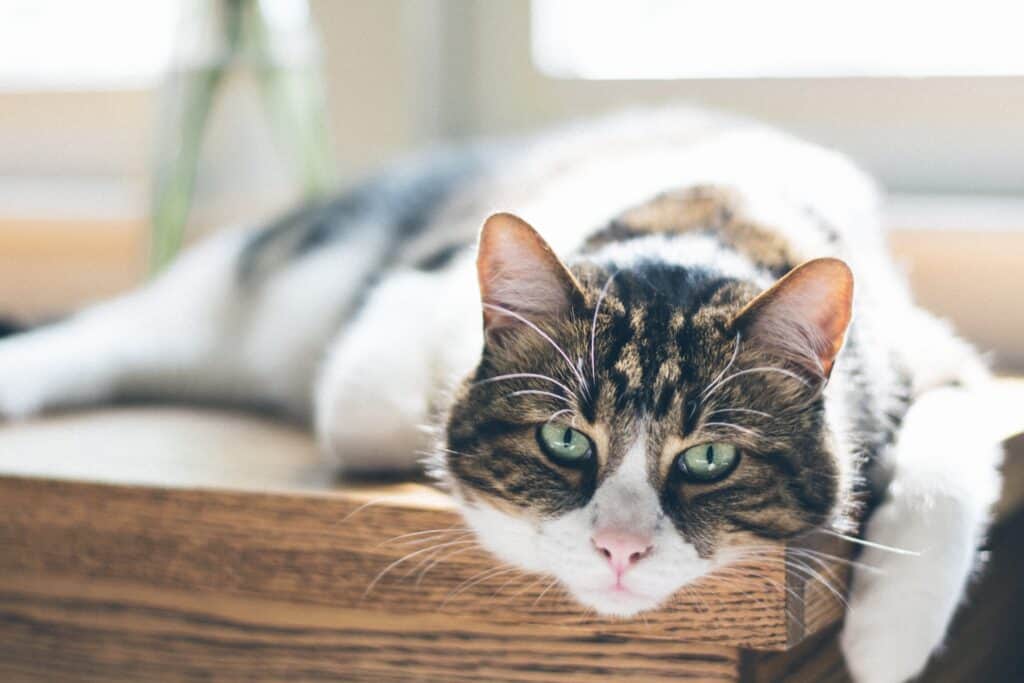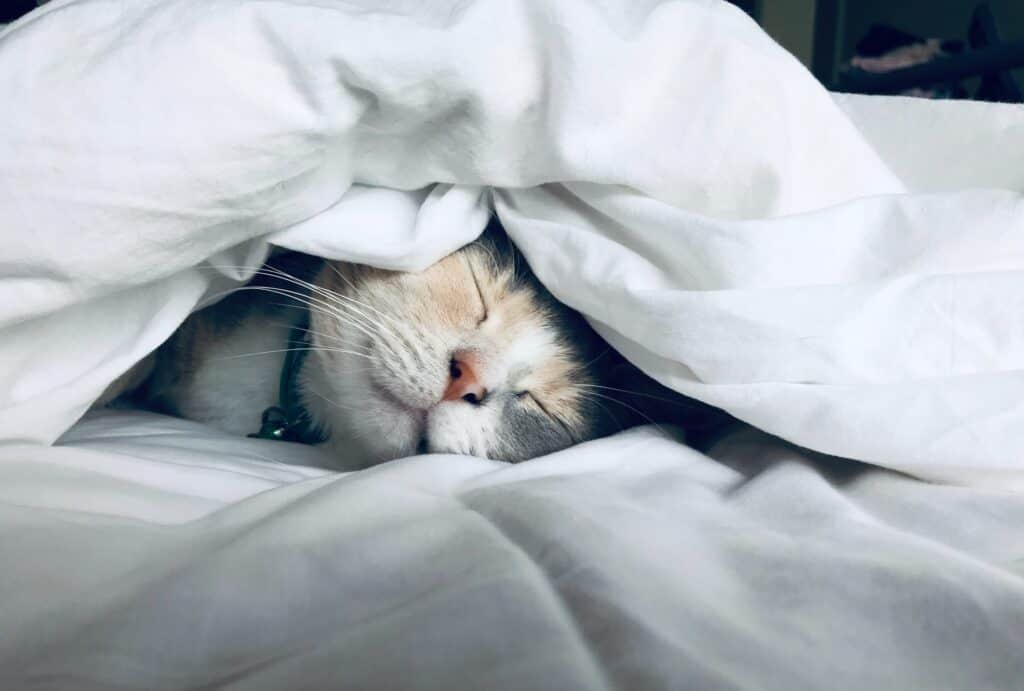The oldest cat to ever live passed away at the old age of 38. On average, household cats live between 10 and 15 years.
Of course, we cat parents want to ensure we can keep our beloved furballs with us for as long as possible and in good health.
So, here are 10 ways to make your cat live longer and grow old together.
When you’re done reading these great tips, see the average life span for your cat here: How Long Do Cats Live?
1. Regular check-ups at the vet
Regular visits to the vet can help spot potential health issues before they become a problem.
It’s always better to prevent disease than to cure it, and many health problems in cats can be prevented or delayed when diagnosed early.
Routine lab tests and wellness exams can help diagnose severe conditions early, and more and more pet insurance policies include regular health checks and potentially save your cat’s life.
As a rule of thumb, cats should have a health check-up twice a year. Once for a wellness exam and once to have bloodwork done once a year.
Bloodwork can determine the general health of your cat’s internal organs, like the kidneys, liver, and heart.
Spotting potential health issues early can help your cat live longer.
2. Choosing the right vet
Choosing the right vet is as important as going there regularly for your cat’s health check-ups.
It’s a good idea to shop around and try several vets before settling for a permanent one. Online reviews can help you make your choice. Also, consider things like experience and educational background and that they share the same love and care for your cat.
Choosing a smart and caring veterinarian is just as crucial in ensuring your cat lives a healthy and long life, so do your research.
Try not to make cost a significant consideration when selecting a good vet. Good pet insurance can help offset some or, in some cases, all expenses.
3. Helping your cat to exercise
Frequent exercise keeps muscles, joints, tendons, and ligaments in good condition. Just as this is good for us, it also benefits your cat.
Getting your cat’s heart rate up every day is also good for their circulation and overall condition.
As your cat ages, it becomes susceptible to conditions like arthritis and diabetes, accelerated by obesity.
Exercise helps manage your cat’s weight and benefits their health in the long run. This will help make your cat live longer.
Although playing with your cat regularly is a lot of fun, sometimes life gets in the way, and spending quality time with our pets falls by the wayside.
If you find yourself strapped for time to play with your cat, it’s a great idea to find your cat a playmate. Most cats, especially younger ones and the more social breeds like Siamese cats, respond positively to this.
Cats love to chase each other around the house. This helps them burn a lot of energy, is good for their muscles, joints, lungs, and heart, and it’s also mentally stimulating.
Some other great ideas to help your cat get some exercise:
- Play with your cat using a cat toy.
- Avoid the popular laser pointers as it is very dissatisfying and frustrating for a cat never to catch the ‘prey’.
- Use a toy that moves so your cat can chase is
- Build a playhouse from cardboard boxes
Mental and physical stimulation is essential for a cat’s development and happiness. The more active your cat is, the longer it may live.
4. A good diet is essential
For any living creature, including humans and cats, what we eat directly impacts our health and quality of life.
To lead a long and healthy life, your cat needs proper nutrition.
Cats are obligatory carnivores. This means that they have to eat meat to survive.
An essential component that a meat diet can offer is protein. Cats need a high-protein diet with healthy fats like Omega-3 and Omega-6.
Feeding your cat the food they would naturally get in the wild is beneficial. This includes fresh meat that is high in protein and minerals.
Cats don’t burn carbohydrates very efficiently, which will easily cause them to be overweight.
For this reason, feeding your cat only kibble may not be the best choice.
We do advise making dry food a part of their diet, but it should be an extra, not the primary component, as it consists of 30-50% of carbohydrates that contribute to obesity.
The low water content in kibble can later contribute to kidney and unary tract problems.
Lastly, it’s best not to feed cats any human foods, especially no milk!
Suggested reading: Why Cats Shouldn’t Drink Milk
So, what can you feed your cat? Here are some ideas that are a healthier choice:
- You can try a raw meat diet
- Canned wet food that has meat or fish as its primary ingredient
- Moderate amounts of raw salmon or tuna are also good choices
For more information about selecting a good cat diet, have a look at the video below
5. Showering your cat with love
Love is more essential and powerful than you might think. Although cats may seem independent and sometimes aloof, they need love and care like any living being.
Cats depend on their owners for everything, including their daily dose of love. Don’t underestimate the positive impact your love can make on their mental health, reducing stress and keeping them healthy.
Like humans, cats can get lonely. Make sure your cat knows how special it is to you, and spend time with them on a daily basis.
This can be time spent playing together, cuddling, or exercising. Quality time together will have a massive impact on your cat’s happiness.
Suggested reading: Tips to prevent your cat from being lonely.
6. Encourage mental stimulation
Mental stimulation is significant for cats. It helps them stay active and sharp as they age.
If your cat is an indoor cat, it helps to give it access to a window from where they can see the world outside.
A view of nature or a busy street is great; for cats, there is always something interesting to see.
If that’s not an option, try to play nature documentaries on TV. This really stimulates some cats.
Or perhaps it’s a nice idea to try and take your cat outdoors on a leash and let them experience nature under supervision. Building a catio is also an option if you’d rather not let your cat roam free outside.
Other ways to stimulate your cat are by giving them toys where they have to figure stuff out, like cat puzzles or a food puzzle.
Be creative, all cats are different, and your cat may like other things than my cat. See what toys they enjoy. Maybe building a maze from cardboard boxes is something your cat will like.
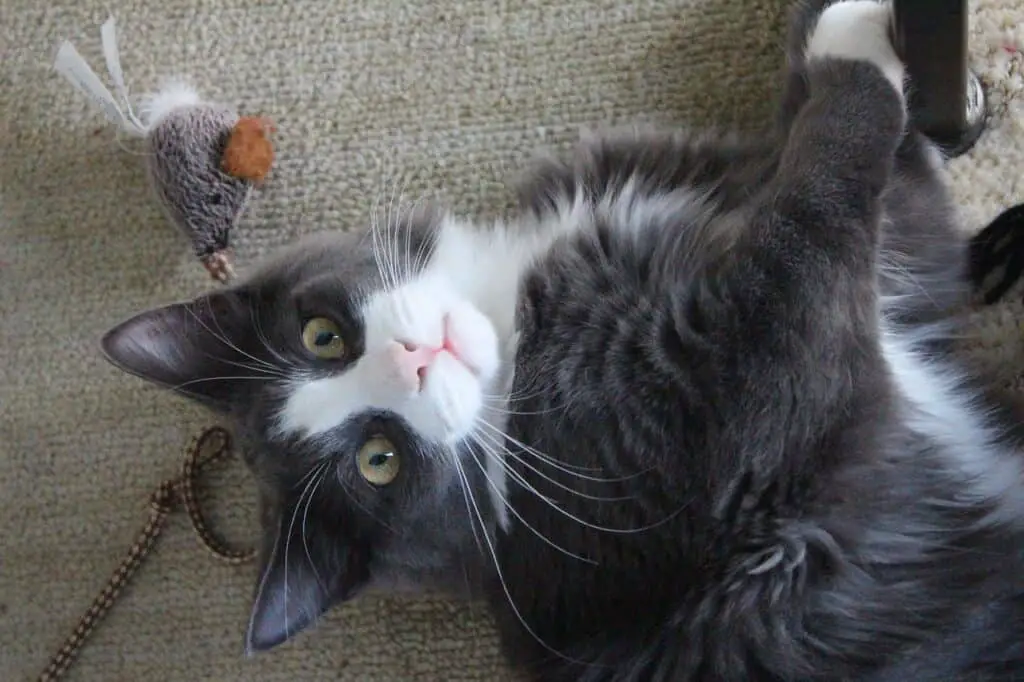
7. Monitor your cat’s health
Regular check-ups are essential for your cat’s health, but there may be times as they age when your cat exhibits certain behavior or symptoms that could indicate a health problem.
Even if you’re unsure if it requires a trip to the vet, it’s always best to ensure that everything’s okay.
Neglected health issues tend to get worse over time. It’s always better to be safe than sorry.
A few tips of what might indicate illness are:
- Changes in litterbox behavior. Sudden increases or decreases in litterbox use often indicate something’s not right.
- Changes in appetite or vomiting
- Sudden and excessive shedding
- Hiding or avoiding contact
Be proactive with your cat’s health, which will help them live longer.
8. Keep your cat warm
It’s no secret that cats love warm places.
That’s not only the case because it makes them feel comfortable but also because their body temperature is higher than ours. Their small body loses body heat quite easily, especially for older cats.
During the winter, a cat’s food intake may increase to stay warm. Make it easier for your cat to keep warm and provide a comfortable cat bed or place near a heater.
For places with cold winters, you can get a heated cat bed that will warm to your cat’s ideal body temperature. These beds are very energy-efficient, and your cat will love it.
Suggested reading: How do cats survive in the cold
9. Spay and neuter
Spaying or neutering your cat prevents the risk of memory or testicular cancer later in life.
It also eliminates the numerous complications that can happen while giving birth to female cats.
10. Keep your cat indoors
Keeping your cat indoors is one of the easiest ways to increase the chances of your cat living a long and healthy life.
The world outside our homes is dangerous, and as cat parents, it is our job to protect them and keep them safe.
Indoor cats are less likely to be hit by a car, attacked by (wild) animals, encounter toxins, or get infected by a disease.
This doesn’t mean you can’t take your cat outdoors; you just need to supervise them. Getting your cat used to go outside on a leash is a great way to let them enjoy the outside while you keep an eye on their safety.
Our Final Thoughts
There you have it, 10 ways to live make your cat live longer.
While most of these are common sense, and we, as devoted cat parents, may already know most of these tips, sometimes life gets in the way, and we forget things like regular vet check-ups.
In a nutshell, most of the things we do to keep ourselves healthy such as exercise, a healthy diet, and good medical care and prevention, will also benefit your cat.
Suggested reading: Do Cats Get More Affectionate With Age?
Love cats?
Then you will enjoy our other content as well. Have a look at these other posts on our website.
-

10 Ways to Make Your Cat Live Longer
The oldest cat to ever live passed away at the old age of 38. On average, household cats live between […]
-
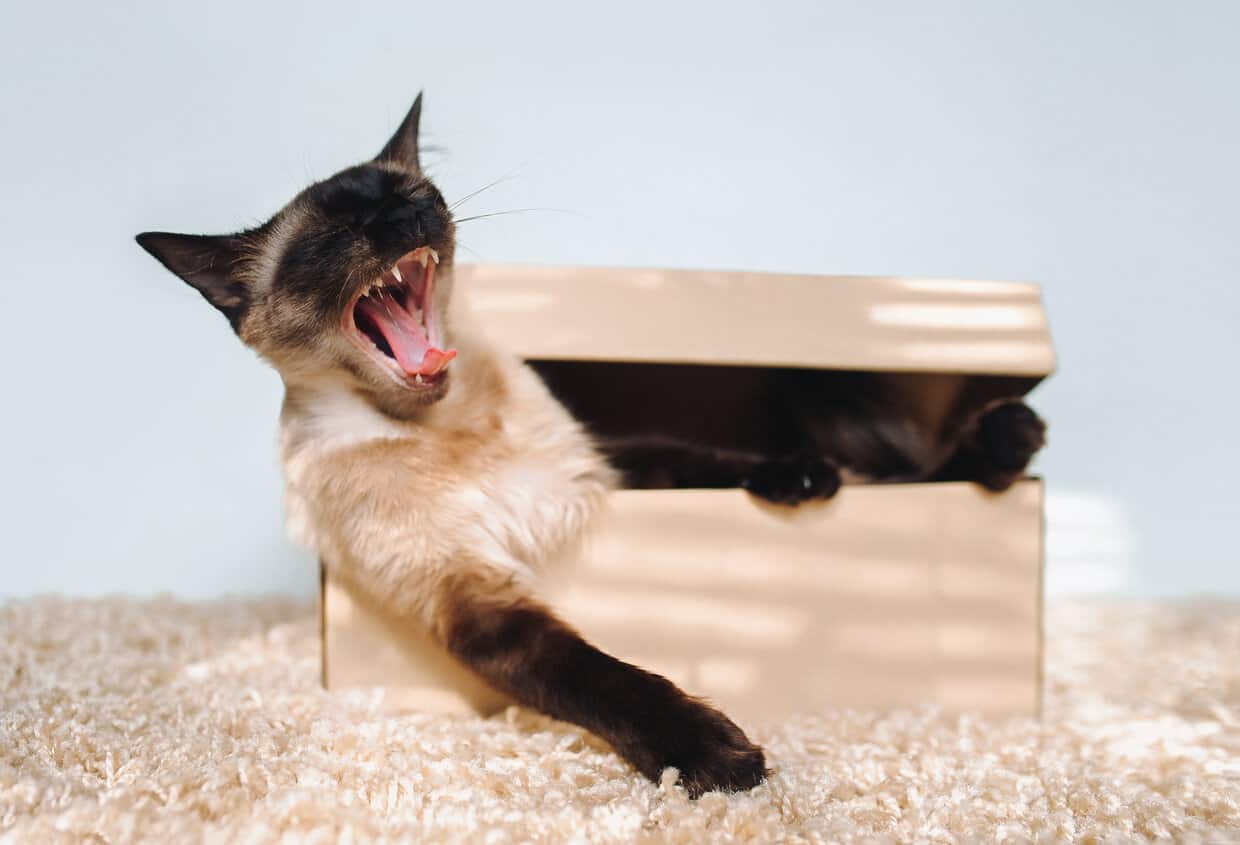
12 Reasons Why Siamese Cats Cry at Night
Siamese cats are a popular breed of cats that many people choose to have as pets. Perhaps you have heard […]
-
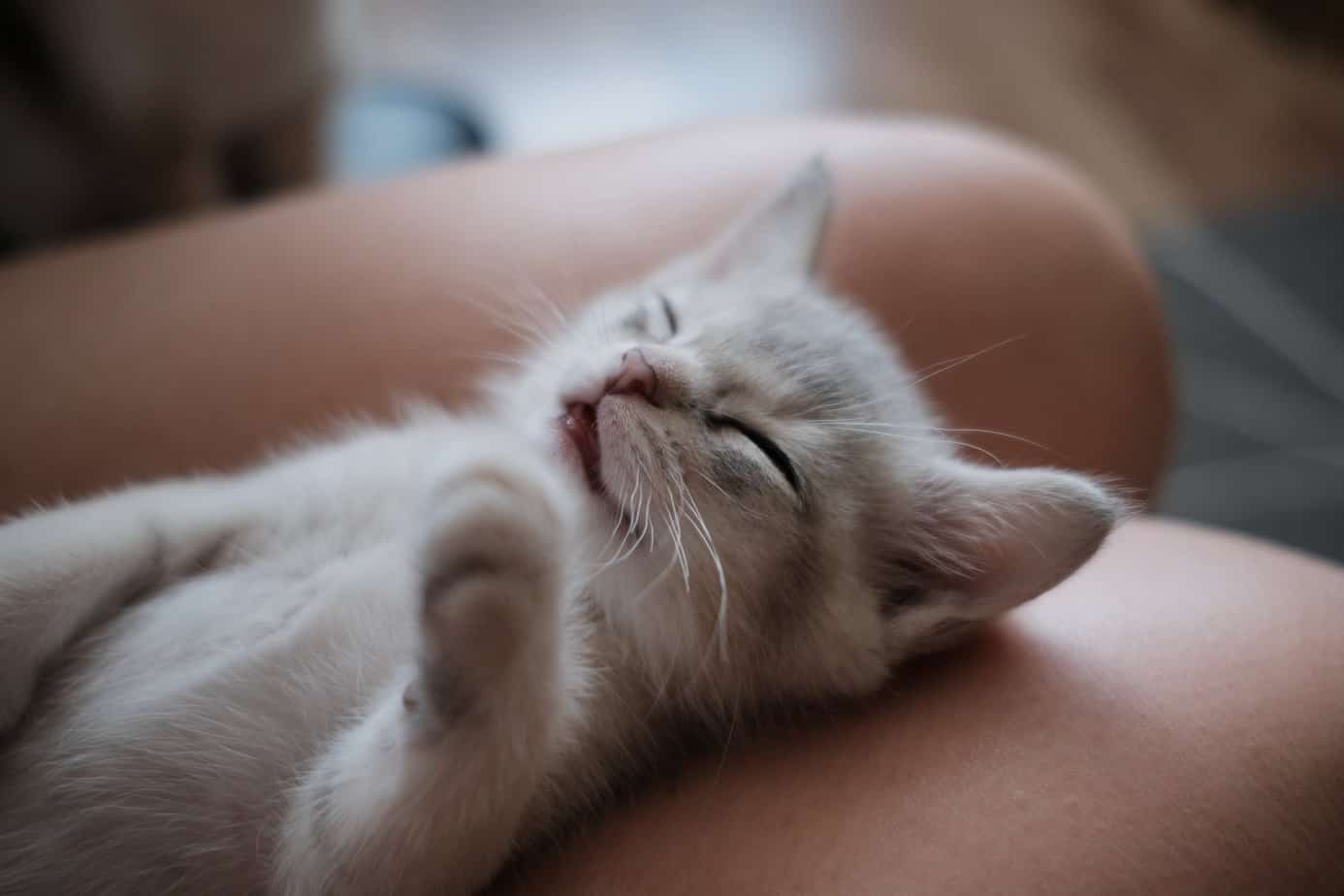
15 Incredible Ways That Cats Show Affection For Humans
Wondering how cats show their affection for humans? We have listed several incredible ways that cats are trying to show their love for us.



